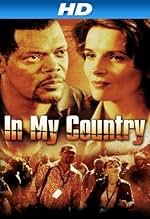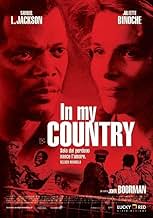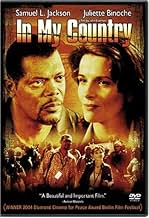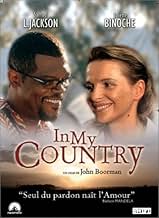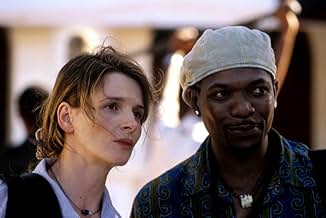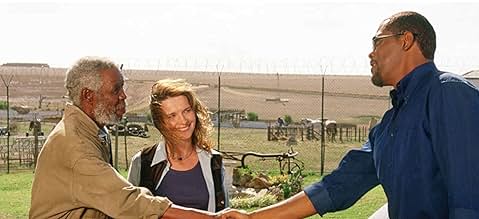Sullo sfondo delle udienze della Commissione sulla verità e Riconciliazione del Sud Africa, il giornalista del Washington Post, Langston Whitfield incontra Anna Malan, una poetessa Afrikaans... Leggi tuttoSullo sfondo delle udienze della Commissione sulla verità e Riconciliazione del Sud Africa, il giornalista del Washington Post, Langston Whitfield incontra Anna Malan, una poetessa Afrikaans che segue le udienze per conto di una radio sud africana.Sullo sfondo delle udienze della Commissione sulla verità e Riconciliazione del Sud Africa, il giornalista del Washington Post, Langston Whitfield incontra Anna Malan, una poetessa Afrikaans che segue le udienze per conto di una radio sud africana.
- Regia
- Sceneggiatura
- Star
- Premi
- 1 vittoria e 3 candidature totali
- Dumi Mkhalipi
- (as Menzi 'Ngubs' Ngubane)
- Albertina Sobandla
- (as Harriet Manamela)
- Sgt. de Smidt
- (as Daniel Robbertse)
Recensioni in evidenza
The film is set against the real life "Truth and Reconcilliation Commission" set up in South Africa after apartheid in order to begin the process of healing the wounds of a divided nation.
However this commission is not the subject of the film, it is the setting. The main drama of the film emanates from the love/hate relationship between journalists Langston Whitfield (Samuel L.Jackson) and Anna Malan (Juliette Binoche).
Whitfield, a Washington Post journalist, is sent to South Africa to cover the hearings. He meets local journalist Anna Malan who is covering the hearings for radio. She trusts the commission entirely and believes forgiveness is the only way forward for her country.
Whitfield however places no trust in a system that does not punish. The pair immediately clash and begin a battle of wills.
however soon the enormity of the evidence they hear draws them together into an affair.
Boorman is not interested in exploring the TRC as a system or it's successes and failures. Instead he is more interested in its impact on his two vastly different protagonists, who must confront issues of race and gender in their own relationship as much as in their work. This is the films strength and weakness. It is beautifully intimate yet is set in a time of great social upheaval which is all but ignored.
The other major problem is that much of the early dialogue sets out to explain the political and social setting rather than define the characters. This leads to somewhat inane characterisation.
With Binoche however Boorman has struck it lucky. Her hard work is evident and although her character is poorly drawn the actresses understanding of emotion allows us to read much into her performance. Even her Afrikaans accent is passable. She displays an incredible tenderness throughout the film. Jackson however does not fair as well, giving a sullen and almost lethargic performance.
To call COUNTRY OF MY SKULL an utter failure as has been suggested by some critics is unfair. With his female protagonist and interesting setting Boorman's sincerity is beyond question and for that alone he deserves praise.
But why is it that In My Country doesn't pack the necessary heat to make one identify and feel upset for the characters on screen? I think a lot of it is down to the overall approach director John Boorman adopts. The film feels like several things at once rather than an actual case-study of post-Apartheid era events that will change and affect lives just as lives were changed and affected during the era. You might argue that the best way to tackle historical issues that deal with human cruelty to other humans is to set whatever story or narrative you're doing during the actual time thus giving a first hand account of what went down and how. Many films have done this in the past but films such as The Pianist and perhaps more notably The Deer Hunter are so vast in their scale that they manage to cover life prior to 'the event'; the event(s) themselves and then the aftermath of it all through either escape or returning to their former lives before 'the event'.
Interestingly, both those films look at prisoner of war scenarios, Jews to the Nazis and Americans to the Vietnamese, respectively. In My Country is more a look at what happens after 'the event', that being the Apartheid and all the atrocities that befell South Africa midway through the twentieth century. Trouble here is that the best the rest of the world can do here is show up, look glum at a couple of press conferences in which South African men of the law admit what they did and then report on the confessions, something that one character cannot even get much space for in his respective newspaper.
As a film alone, In My Country works as a re-telling of events that happened after an atrocity but it never delves deep into its subject matter. The Apartheid and the people involved in the Apartheid are not the central characters in fact they are relegated to giving accounts at timely spaced intervals throughout the film that hope to produce the odd tear from the audience. Families of the victims bursting into tears and music native to Africa that balres up try to add to the emotion felt in these scenes. But that's about as good as it gets with the rest of it crossing genres in and out of romance, historical, melodrama and the overall approach that gets tangled up that is the docu-drama.
At its very centre, In My Country has an American journalist named Langston Whitfield (Jackson) travelling to a country to cover events few people will have an interest in. It's interesting that a film dealing with the post-Apartheid era would have an American at its core as the lead male and not a South African. There is a South African lead of sorts but they are female and they are pulled up by Whitfield on more than one occasion about the treatment they gave the black inhabitants of the nation. Here there is a confused triangle of conflict; Whitfield is American and complains about Anna Malan's (Binoche) nation's treatment of blacks but as an American he could be read into as representing America, a powerful nation that did nothing about the Apartheid anyway. Then there is the fact Whitfield is black himself and his beef with Malan's nation's treatment of blacks could just be something personal.
The fact Malan is female in the first place immediately relegates her from what she would have been had the character been male. As a male, Malan would have made a good foil for Whitfield and the personal prejudice might not have existed as much. It's no secret that women in films have always been lowered somewhat when pitted against men indeed theorists have argued that all films are shot for the male audience in mind so women view things through a male perspective when watching a film. But the fact sexual tension is present in the film between these two adds another layer of confusion and opens up the possibility that the film could fall into the romance as well as the, shock, 'buddy' genre. They fit the bill in the sense they are binary opposites to one another (black/white; male/female; American/South African, etc.) and rebound dialogue off one another but is there really space for 'buddy' content in a film about post-Apartheid South Africa?
Twinned with this, there are other sloppy instances that aid the film in its mediocrity. When we first get an introduction of any sorts of chief villain De Jager (Gleeson), it is a visit to his house at night; complete with eerie music and we see a lot of animal heads on his wall he must be a baddie. As well as this clumsy labelling, De Jager's press conference right nearer the end does not act as the final moral catalyst for the film but rather as a plot point for Anna's family to ultimately fall apart which was unfortunate. While it's all nicely unfolded and cute for what it is, In My Country bogs itself down with confused studies and feels like a missed opportunity.
The African sense of justice is about reconciliation, not revenge. By using the testimonials of several individuals, this movie was very educational. The healing that was allowed to happen within the process of reconciliation was very inspirational. Their sophisticated system made a lot of sense to me, and seems much more advanced than systems employed where i live in the US.
The relationship between Langston and Anna brought a political story to a personal level. It was beautiful to see Anna come to terms with her own sense of responsibility, being a white south African who had known of the atrocities, but had done nothing to stop them. Langston forced her to examine her position, but was also there to support her when she felt crushed by the enormity. Their acting was very convincing and skillful. I especially loved the scene where Anna attacked Langston, but thought the actual sex scene could have been more believable.
One character I haven't seen anyone comment on is Anna'a assistant, Dumi. This character brought the story to yet another level. He was the classic joker with hidden depths. His character communicated to the audience that nothing is black or white; nothing is simple; really it's all endlessly complex.
In fact, this story was anything but one-sided. It showed many masks that individuals wear in specific situations. It communicated so much about humanity, both as individuals and as members of a larger society. I find it quite relevant to my experience as a white American who knows my government is responsible for the suffering of multitudes at this moment in time, and I feel responsible and helpless at the same time.
A man who sat behind me in the theater kept telling his girlfriend he wanted to leave because it was unpleasant. Yes, it is unpleasant, if you're the type of person who doesn't like to look at reality. But what I cam away with from the movie was a feeling of awe about humanity's capacity for compassion.
However, director Boorman has chosen to balance the emotional testimony of the victims with a sometimes humorous side-story involving an American journalist, played by the great Samuel L. Jackson ("Coach Carter") and a local 'white' radio reporter, played by the equally great Juliette Binoche ("The English Patient").
Certainly, a story of this import deserves a documentary but as it stands, this is as close as any American will ever get to this story since many newspapers buried it when it originally occurred. Racism is an ugly thing, but forgiveness is a beautiful thing and this movie balances the two in an effective and entertaining manner.
Check this one out, especially if you are a fan of "Hotel Rwanda" and hearing the 'truth' for a change.
Lo sapevi?
- QuizAfter seeing this film Nelson Mandela called it, "a beautiful and important film about South Africa's Truth and Reconciliation Commission. It will engage and influence not only South Africans, but people all over the world concerned with the great questions of human reconciliation, forgiveness, and tolerance."
- BlooperAll number plates on vehicles throughout the film (apart from archival footage) are fake and do not follow the format of older South African number plates.
- Citazioni
Anna Malan: [last lines - voiceover] Because of you, this land no longer lies between us but within. It breathes becalmed, after being wounded in its wondrous throat. In the cradle of my skulll it sings, it ignites my tongue. Five thousand stories are scorched on your skin. I am changed forever.. I want to say, forgive me, forgive me, forgive me.
- ConnessioniEdited into In My Country: Deleted Scenes (2005)
- Colonne sonoreSenzenina
Arranged by Murray Anderson & Warrick Swinney
Performed by Princess Soi-Soi Gqeza, Mxolisi Mayekane, Mandia Lande, Michael Ludonga, Simpiwe Matole & The New Teenage Gospel Choir
Published by Hi-Z Sound
I più visti
- How long is In My Country?Powered by Alexa
Dettagli
- Data di uscita
- Paesi di origine
- Siti ufficiali
- Lingue
- Celebre anche come
- Country of My Skull
- Luoghi delle riprese
- Aziende produttrici
- Vedi altri crediti dell’azienda su IMDbPro
Botteghino
- Budget
- 12.000.000 USD (previsto)
- Lordo Stati Uniti e Canada
- 163.893 USD
- Fine settimana di apertura Stati Uniti e Canada
- 22.383 USD
- 13 mar 2005
- Lordo in tutto il mondo
- 1.491.434 USD
- Tempo di esecuzione
- 1h 45min(105 min)
- Colore
- Mix di suoni
- Proporzioni
- 1.85 : 1


